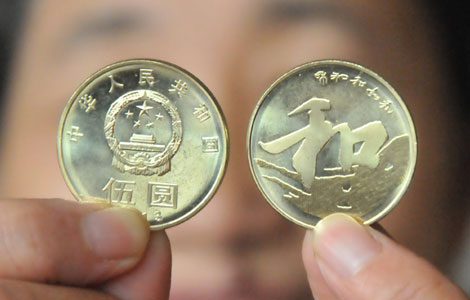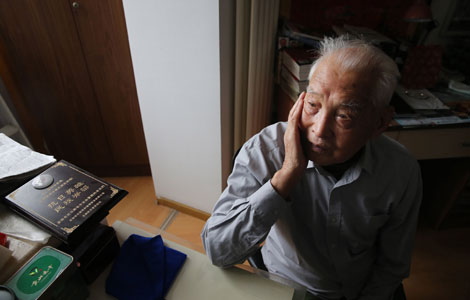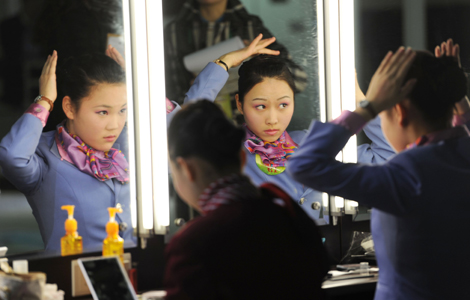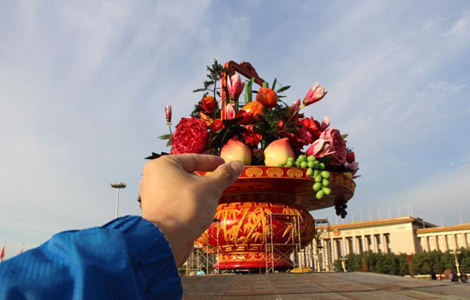Court media officers get greater say
Updated: 2013-09-24 01:55
By Zhao Yinan (China Daily)
|
||||||||
Enhanced autonomy to promote transparency of judicial system
Court media officers have been given greater autonomy to release case details, a source close to the matter said on condition of anonymity.
The change in the publicity department of the Supreme People's Court is expected to ensure better access to judicial information, including hearings.
The source said the upgrade is part of internal restructuring, although the top court is still seeking final approval from the Organization Department of the Communist Party of China Central Committee, which could "take some time".
He Bing, a professor at China University of Political Science and Law, said the change will allow court media officers to have more say in releasing information, instead of bowing to judges or other officials, who may not be as open-minded.
Previously, the department's administrative rank was one level lower than tribunals, he said, which sometimes "forced media officers to yield to the orders of judges".
Raising the administrative level of the publicity department is part of a reform following the inauguration in March of Zhou Qiang, the top judge of the Supreme People's Court.
Known for his experience in the judicial system, Zhou has been calling for better judicial credibility and more transparency since he took office.
Seminars soliciting advice on how to improve judicial news releases have been held for journalists and legal professionals, and in-field investigations have been conducted.
Underlining the public attention paid to judicial work, Zhou urged senior judges and media officers from local courts to catch up with new media, which he said requires "not only the release of information in a timely manner, but also responding to questions and misunderstandings online".
As of this month, courts nationwide have opened 955 accounts on Sina Weibo, according to People's Court Daily.
The top judge's focus on transparency has filtered down to lower courts. Some have appointed deputy chief judges to handle news releases, a move welcomed by legal experts.
Li Ji, head of publicity for Shijiazhuang Intermediate People's Court, said his office is considering recruiting more people to cope with the rising demand.
"I've heard many courts in other cities are also making recruitment plans to reinforce publicity teams," he said.
The court in neighboring Handan posted real-time updates via micro blog in June of a controversial rape-murder case, in which the suspect confessed to a crime for which another man was executed almost 20 years ago.
Key issues being discussed by the defendant's lawyers and prosecutors were put online in 29 micro blog posts by the provincial court.
Information released via micro blog was followed in the trial of Bo Xilai, a former member of the top ruling political bureau, winning applause from home and abroad.
The Supreme People's Court for the first time invited foreign media to cover its news conference last week, and started to broadcast its monthly news conference in May.
According to a document provided by the Supreme People's Court, the body is working on a roadmap for its human resources management reform.
"The top court will push forward reform of the judicial career ladder and gradually set up a new system, which is in line with the professional characteristics of judges," it said.
In his first meeting with chief judges, top judge Zhou urged them to "work independently" from local governments, and collaborate with colleagues from other courts to overcome regional and departmental protectionism.
Xu Qianfei, chief judge at Jiangsu High People's Court, said in a previous interview that setting up a separate ranking for judges would ensure the independence of courts. "The current way to manage judges is similar to the way of managing government officials, which weakens the occupation's expertise and may impair independence," he said.

 China's investment a 'job-saver' in Europe
China's investment a 'job-saver' in Europe
 Pollution control plan to slash PM2.5
Pollution control plan to slash PM2.5
 The beauty and beasts of selling hot houses
The beauty and beasts of selling hot houses
 Tian'anmen's flowery moments for National Day
Tian'anmen's flowery moments for National Day
 When animals meet beer
When animals meet beer
 Microsoft revamps Surface to challenge Apple
Microsoft revamps Surface to challenge Apple
 Gold rush for new coin
Gold rush for new coin
 China's growth: Fundamental challenges still remain
China's growth: Fundamental challenges still remain
Most Viewed
Editor's Picks

|

|

|

|

|

|
Today's Top News
93 killed as quake hits SW Pakistan
Smithfield deal 'great' for US shareholders: CEO
China expects to complete space station by 2023
China rebukes US drone reports
New top trader coming to stage
UN General Assembly starts debate
China aims to attract more foreign students
Microsoft enters China's gaming market
US Weekly

|

|





